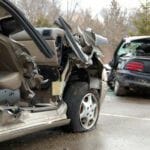12 Warning Signs Of Driving Deterioration
December 9, 2014 / Vehicle Accidents
Alzheimer’s disease is a tragic eventuality for an ever-growing portion of our population. According to the Alzheimer’s Association, by the year 2060, the number of Americans with this disease or a related disorder could range from 11.3 million to 16 million. Caring for a loved one with cognitive impairments is difficult, and one of the most problematic situations that must ultimately be addressed is the inability of the person to continue to drive. Indeed, this determination must often be made for elderly people who don’t have mental disabilities; visual and auditory problems also contribute to unsafe driving.
When dementia is present, who typically calls a halt to the individual’s ability to drive? Family members? Doctors? The driver himself?
Obviously, a person whose ability to reason is compromised by dementia is not in a position to adequately assess his or her driving skills. And being able to get behind the wheel of a car is strongly linked to feeling independent, as well as to maintaining social connections, so most elderly drivers are not going to willingly hand over the keys.
A medical professional, then? Is it the duty of a physician to take actions that force a person who has dementia to stop driving? In some states, that is indeed the case. California state law, for instance, specifically requires physicians to report to the DMV all patients diagnosed with Alzheimer’s disease. The DMV is charged with following-up and evaluating the driver and, possibly, revoking their license. Many other states require the reporting of a medical condition which could result in a lapse of consciousness or permit a physician to report any condition which impacts public safety. For the most part, however, mandatory reporting is controversial because of possible or perceived violations of the patient’s right to privacy. Even the Alzheimer’s Association Board of Directors is opposed to it, adopting the following position in 2011: “The Association does not support mandatory reporting as a solution to the driving and dementia issue because it can have unintended consequences, including an unwillingness for individuals to seek early diagnosis; risk to the relationship between the physician and patient; and even an unwillingness of physicians to appropriately diagnosis Alzheimer’s disease.”
The primary duty, then, falls to family members and caregivers to watch for signs that it is no longer safe for a person who has dementia to continue to drive. Patients with mild dementia, as a group, are higher-risk drivers; and yet, according to the American Academy of Neurology, as many as 76% are still able to pass an on-road driving test. Remember that good-days/bad-days are typical for dementia patients. Here are some of the warning signs that may not be present during a driving test but which indicate that it could be time for family to step in and make that difficult decision that their loved one is unsafe behind the wheel:
- Forgetting how to locate familiar places
- Failing to observe traffic signs
- Making slow or poor decisions in traffic
- Driving at an inappropriate speed
- Becoming angry or confused while driving
- Hitting curbs
- Using poor lane control
- Making errors at intersections
- Confusing the brake and gas pedals
- Returning from a routine drive later than usual
- Forgetting the destination during the trip
- Receiving citations for moving violations.
Families can also adopt a proactive strategy by arranging for a comprehensive driving evaluation by an occupational therapy driving rehabilitation specialist. These professionals administer in-office tests as well as behind-the-wheel evaluations to achieve an objective understanding of the impact of the individual’s dementia on their ability to safely drive. They can identify strategies, equipment, and training which might improve a person’s driving safety, and when driving is no longer an option, the occupational therapist can help locate appropriate transportation alternatives and community resources.
At Stephenson Rife, we’re often called upon to help Hoosiers who have been in car accidents. We encourage you to maintain open lines of communication between your family members who may have a dementia-related illness and their medical providers and caregivers so that the final decision is made as objectively and as firmly as possible. Keeping the roads safe for everyone takes a team approach. If we can help you in your efforts, call us at 1-317-825-5200.

 Mike Stephenson has 40 years of experience and is a trusted advisor to many individuals and companies. His current practice is dominated by civil litigation in state and federal courts. He focuses much of his time on handling catastrophic injuries caused by all types of accidents, including motor vehicle, trucking, workplace injuries, product liability, and fire, just to name a few. He also works extensively in construction accidents. [
Mike Stephenson has 40 years of experience and is a trusted advisor to many individuals and companies. His current practice is dominated by civil litigation in state and federal courts. He focuses much of his time on handling catastrophic injuries caused by all types of accidents, including motor vehicle, trucking, workplace injuries, product liability, and fire, just to name a few. He also works extensively in construction accidents. [ 